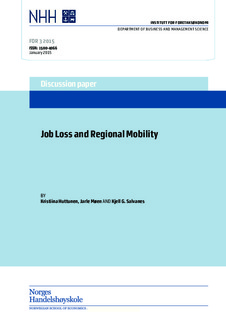Job Loss and Regional Mobility
Working paper

Åpne
Permanent lenke
http://hdl.handle.net/11250/274517Utgivelsesdato
2015-01-19Metadata
Vis full innførselSamlinger
- Discussion papers (FOR) [566]
Sammendrag
It is well documented that displaced workers suffer severe earnings losses, but not why this is so. One reason may be that workers are unable or unwilling to move to regions with better employment opportunities. We study this and find that job displacement increases regional mobility but, surprisingly, we also find that displaced workers who move suffer larger income losses than displaced workers who stay in the same region. This is not a selection effect, but reflects the fact that non-economic factors such as family ties are very important for the decision to migrate. Workers are less likely to move if they have family in the region where they already live, and job loss stimulates workers to relocate with parents and siblings when they live in different regions. Looking at earnings we find that the entire post displacement income difference between displaced movers and stayers is driven by workers moving to regions where their parents live or to rural areas. Furthermore, when looking at long-run family income, we find that the difference between displaced movers and stayers is very modest. With respect to selection, we find that migrants are positively selected on average, but very heterogeneous. They seem to be drawn disproportionately both from the high and the low end of the skill distribution in the region they leave.